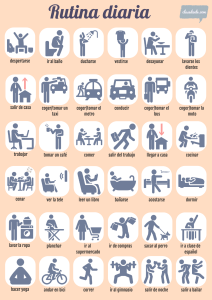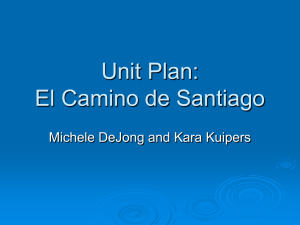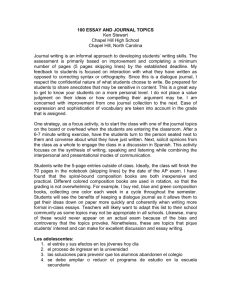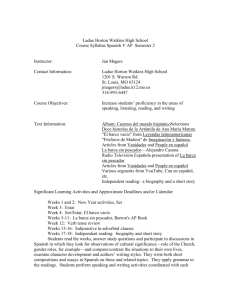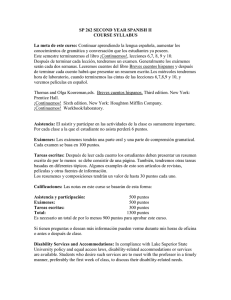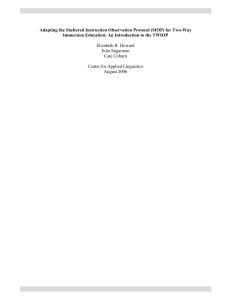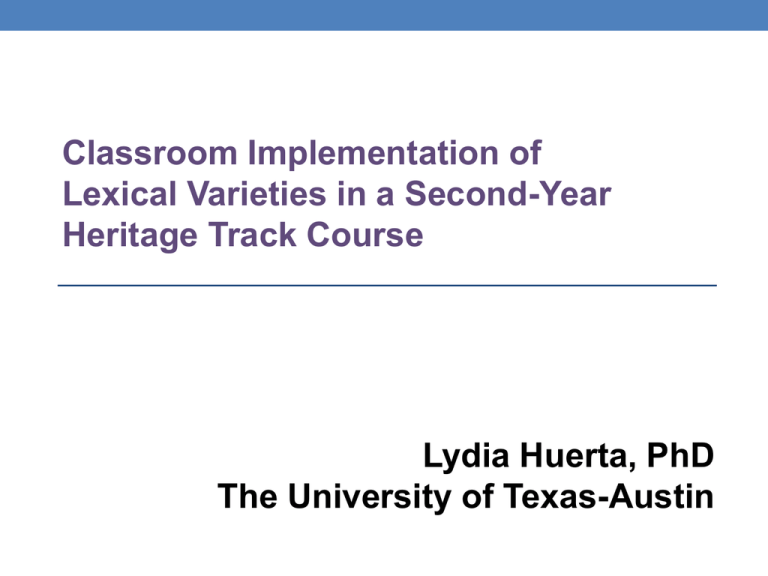
Classroom Implementation of
Lexical Varieties in a Second-Year
Heritage Track Course
Lydia Huerta, PhD
The University of Texas-Austin
Objectives
• Move away from lexical activities that promoted
vocabulary lists, memorization, and replacing student’s
knowledge of language with what is considered
‘standard’.
• Allow time for students to reflect on the nature of
language through a specific example related to lexical
variation.
• Help students become conscious of the power that
language has to create knowledge, communicate
information, and manipulate social situations.
Design
Part 1: Language Use/Awareness Cultural text (comic)
with guided questions
Part 2: Language Performance Taller de teatro
Part 3: Language Reflective Judgment Questions
about creating the skit
Part 4: Language Production Assess, comment or
critique dictionary definition
Implementation
• 60 minutes
• Students had 15 minutes for each section
• They worked individually on all sections, except for the
“taller de teatro”
• After each section, students volunteered to share their
responses with the rest of the class.
• Activity was turned in at the end of the class.
Part 1: Language Use/Awareness Cultural
text (comic) with guided questions
1a. Lee el siguiente cómic y después responde a las
siguientes preguntas. Una vez que las completes comparte
tus respuestas con tus compañera/os.
Part 1 continued…
1.
En este cómic hay varios malentendidos, ¿puedes nombrar por lo
menos dos?
2.
La policía le dice al ladrón que “coger en España no es lo mismo
qua acá...coger allá’ significa agarrar”, con decir “allá” ¿a que
lugar o lugares se refiere?
3.
Para ti, ¿qué quiere decir el verbo coger?
4.
¿Cuáles son algunos sinónimos de este verbo?
5.
¿Por qué crees que existen diferencias en significado del verbo
coger?
6.
¿Por qué crees que el al final del cómic el ladrón dice que “se
parece en algo”? ¿Estas de acuerdo con su observación?
Explica porqué.
Outcomes
• Students were able to identify the main misunderstanding that derives
from the use of the word coger.
• Most were unaware it was popularly used in Spain with the meanings
“to grab” or “to take”
• For all 23 students the word coger had a sexual meaning; yet when
asked for synonyms they produced other meanings like: agarrar,
tomar, escoger, recoger, seleccionar.
• The questions led some students to categorize coger as the product
of the evolution of language. Some students of Mexican heritage
referred to it as an albur. When asked by other non-Mexican heritage
students what it meant. One explained it as a pun or a word with
double meaning. Which in turn produced a discussion of other words
like chile, papaya, panocha, concha, fumar, etc.
Part 2: Language Performance Taller de
teatro
1b. Taller de teatro: Con un grupo de compañera/os planea
una pequeña parodia que represente una situación cultural
en el la que se dé un malentendido con el uso del verbo
coger.
1.Decidan quiénes usarán la palabra como españolismo y
quiénes la usarán como un americanismo.
2.Escojan el escenario (la oficina, un bar, la escuela, un museo,
etc)
3.Escriban el mini-guión de acuerdo la situación (si ocurre en un
contexto formal o informal)
4.Después presenten su parodia al resto de la clase.
Outcomes:
• Students were able to be creative not only about the use
of coger, but also about words like fumar and pan.
Part 3: Language Reflective Judgment
Questions about creating skit
1c. Una vez que hayas presentado y observado las
parodias de tu clase contesta las siguientes preguntas:
1.¿Qué fue lo más difícil de hacer la parodia?
2.¿Cuál parodia fue la que más te gusto? ¿por qué?
3.Si alguna vez te encuentras en una situación donde surge
un malentendido debido a las variaciones léxicas del verbo
coger, ¿cómo improvisarías para mediar la situación?
Outcomes:
• Some students said the hardest thing about creating the
parodies was being embarrassed not because they didn’t
know what ‘coger’ meant, but because they didn’t
understand how to use it.
• Most mentioned that if they found themselves in a
situation where there was a misunderstanding about
lexical variations they would simply explain the difference.
Best Explained…
Part 4: Language Production Assess,
comment or critique dictionary definition
1d. Lee el siguiente fragmento de la Guía esencial para
resolver dudas de uso y estilo y después contesta la
siguiente pregunta.
coger
Verbo transitivo que significa, entre muchas otras cosas, “asir, agarrar o tomar”.
No tiene nada de malo usar este verbo. Cuenta con un total de 32 acepciones en
el artículo enmendado para la 23a edición del DRAE (versión electrónica). Solo
una de ellas tiene connotación sexual: “31. intransitivo. Vulgar. América.
Realizar el acto sexual”. También se usa pronominalmente en este sentido, pero
esto no se menciona en el Diccionario. No tenemos por qué desechar 31
acepciones porque una es sexual y, además, vulgar. ¿Y qué tiene de malo que
una palabra posea una acepción sexual vulgar? ¡No estamos obligados a usarla
de esa manera si no queremos! Hay que perderles el miedo a las palabras y
aprender a usarlas bien, cada una en su contexto correcto.
Sandro CohenGuía esencial para resolver dudas de uso y estilo, 2011.
Outcomes:
• The majority of students agreed with Cohen’s
definition, supporting the varied uses of ‘coger’
according to the context.
• There were a few that like the rest reflected on
the use of language, but also focused on the
political implications of language.
Student Response #1
Sandro Cohen dice que debemos perder el miedo a las palabras y
aprender a usarlas bien. ¿Pero quién es el dueño de los idiomas a
decir que es propia, que es el acepcion verdadero? Yo no estoy de
acuerdo que nada mas hay un significado de cada palabra que
debemos usar. El idioma identifica una persona, para distinguir la de
otras culturas o países. Si estoy de acuerdo que “no estamos
obligados a usarla de esa manera si no queremos’” pero cada persona
tiene su derechoa elegir como se quiere hablar y que definición se
queire usar de cualquier palabra. Somos libres de hacer lo que queremos
Student Response #2
“Yo tengo un opinion que es variado. Creo que todas las
formas de español necesitan ser reconizadas pero al
mismo tiempo ¿cómo podemos reconocer todas las
formas de palabras sin crear jerarquias. Estoy en
acuerdo con Cohen que no estamos obligados a usar
palabras de esta manera, es nuestra opción. Pero
mientras que Cohen expresó su opinión lo devaluo
otros usos de la palabra.”
Student Response #3
“No, porque aunque un diccionario no menciona algo, una
palabra todavia puede tener varios significados
culturales en diferentes contextos.”
Observations
• This activity can easily lead students in varied directions:
Jokes
Other “questionable” words and different meanings
Questions
Relating personal experiences to the examples “una
vez…”
Political implications of language
Identity politics
It is important to embrace students’ contributions to the
activity and allow them time to reflect on their classmates
observations.
Afterthoughts…
While this activity allows students to flirt with the dirty parts
of Spanish because it brings out the “pipi caca” giggle in
all of us, it can lead to more highbrow discussions that
guide students to become aware of the power that
language has to create knowledge, communicate and
represent cultural paradigms, and interact with others.
THANK YOU!
Contact Information:
lydiahuerta@utexas.edu
http://rethinkinghlinstruction.wordpress.com/

